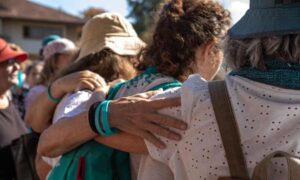
On the morning of 7 October, as news emerged of the Hamas attack on Israeli communities near the Gaza border, Naama Barak Wolfman joined thousands of others frantically texting their friends and family. “Checking you’re alright,” she wrote to her colleague, Vivian Silver, a Canadian who spent decades working to foster peace between Israelis and Palestinians.
The text was never read. Silver was one of several peace activists killed that day, though news of her murder took nearly a month to reach Silver’s friends and family. Many believed the Women Wage Peace leader had been taken hostage, even picturing her negotiating with her captors.
“We couldn’t find the right words to express the pain, the hurt, and the terror. People on both sides were afraid,” Wolfman recalls. “You shut down, you close the windows. In Israel, that’s what everyone literally did for the first few months.”
Over the past seven months, Israeli and Palestinian peace and reconciliation groups have been grappling with how to move forward while dealing with personal grief, government restrictions, internal divisions and the fact that members’ efforts may have been set back decades.
“What happened on 7 October really destroyed the peace movement as a movement,” says Jørgen Jensehaugen, a senior researcher at the Peace Research Institute Oslo. “It’s individuals now, and not a movement.”
Mohammed Abu-Nimer, a professor in peace and conflict resolution at the American University in Washington DC, says periods of intense violence tend to reveal weaknesses in the peace movement. Historically, Israeli peace groups “do not withstand the cruelty or the escalation of the conflict”, he says.
Organisations such as Women Wage Peace, with 44,000 members, including Arabs and Orthodox Jews, and its Palestinian sister organisation, Women of the Sun, acknowledge that peacebuilding is facing its greatest challenge yet, but they will not give up.
“Not everyone has come back to the table but it has to happen,” says Wolfman. “Our ability to maintain a dialogue with different parts of Israeli society is crucial right now. We have to widen our base, we have to have a bigger camp. You have to be a little more flexible.”
